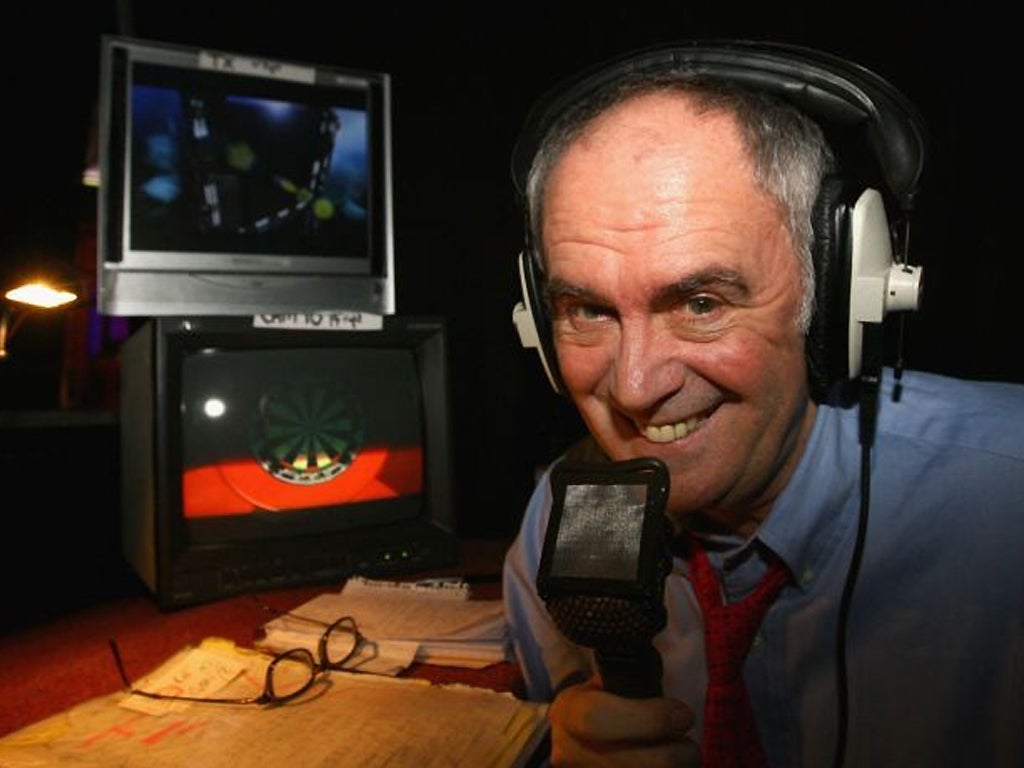Sid Waddell: Voice of darts who raised the sport to an epic plane

Sid Waddell was a broadcaster who popularised and almost single-handed propelled darts into the modern sporting era. With his death at the age of 72 from bowel cancer, the sporting world has lost one of its most colourful and beloved commentators.
Widely known as "the voice of darts," Waddell worked for the BBC and Sky Sports among others and in a number of other areas of the media, including as television news producer, screenwriter, author and Bafta-winning director. He was an all-rounder, a multi-skilled man of words. But darts was always his first love.
Dubbed "the doyen of sports commentating" by broadcaster Jeff Stelling, Waddell's uninhibited enthusiasm and excitable commentary, coupled with his idiosyncratic use of language and plethora of well-known phrases, endeared him to millions. "There hasn't been this much excitement since the Romans fed the Christians to the lions", was a favourite.
Waddell once compared sports commentators. "Cricket had Brian Johnston and John Arlott; football had Kenneth Wolstenholme; athletics had David Coleman; snooker had "Whispering" Ted Lowe. Darts has Sid Waddell – the Geordie Lip." The Daily Mirror's Mike Walters summed up his appeal. "If puns, pathos or peerless analogy is your currency, nobody does it better."
Born in the small market town of Alnwick, Northumberland, in August 1940, Sidney Waddell was the son of a miner, while his mother was a cleaner. He attended King Edward VI Grammar School in Morpeth where he excelled in English and history, earning a scholarship to St John's College, Cambridge, where he read Modern History, graduating with a 2:1 degree.
During his time at Cambridge, Waddell played rugby for St John's and the Cambridge University LX Club, the rugby second team. But injury struck and rugby's loss was darts' gain; he started an inter-college darts competition. St John's lost in the final of this in 1961 to a team of trainee vicars from Selwyn College. Waddell was bitten by the darts bug.
Upon graduation, Waddell was turned down by the collieries for being over-qualified and even contemplated a career in academia, having secured a research assistant position at Durham University. But he unexpectedly joined Yorkshire Television and brought darts into the homes of millions through his creation of The Indoor League programme (1973-78).
Shortly after, Waddell found himself behind the microphone to cover the sport from the inception of the World Professional Darts Championships, and its first winner Leighton Rees, in 1978. Waddell never looked back. Over the next 16 years, with his mastery of the microphone, he ushered in and cemented darts' position as one of the BBC's top spectator sports. He noted in 1984, while watching Eric Bristow win the third of his five world championships, "When Alexander of Macedonia was 33, he cried salt tears because there were no more worlds to conquer... Bristow's only 27."
When the game split in 1993-4, new satellite broadcaster Sky Sports wanted Waddell as its mouthpiece, who it saw as central to their ambitions. It was noted that "on the big occasion he was always there – if he wasn't there it wasn't a big occasion". In 1994, Waddell was finally lured to the channel's revamped PDC darts programmes, which were glitzy and glamorous events packaged for the 21st century. As he put it, "There's only one word for it – magic darts."
While commentating on Phil "the Power" Taylor winning one of his 15 world titles, Waddell quipped with his instantly recognisable North-eastern twang, "If we'd had Phil Taylor at Hastings against the Normans, they'd have gone home." In the same match, he also described the challenge of a player trying to defeat Taylor as "like eating candy floss in a wind tunnel", later adding, "William Tell could take an apple off your head, Taylor could take out a processed pea."
Waddell's other commentary work included pool's Mosconi Cup, an annual nine-ball tournament contested between teams representing Europe and the USA, while he also made a one-off appearance as the BBC National Lottery's "Voice of the Balls". In 1992, he won a Bafta for documentary work and authored 11 books, including Bellies and Bullseyes: The Outrageous True Story of Darts (2007), his autobiographical account of the modern era of the sport; and biographies of darts competitors John Lowe, (Old Stoneface), and Phil Taylor (The Power), whom Waddell regarded as "the greatest living sportsman".
Waddell also wrote BBC children's programmes Jossy's Giants and Sloggers, and received a nomination for best scriptwriter from the Writers' Guild of Great Britain for the latter. Away from the oche, in the 1960s, he had worked with interviewer Michael Parkinson at Granada. His proudest moment came in 2002 when he was voted Sports Commentator of the year, by his fellow sports commentators.
Waddell underwent treatment for bowel cancer in September 2011, but rejoined the Sky commentary team for the McCoy's Premier League Darts tournament at Manchester Arena in February 2012. His character was summed up when he wrote, "After 236 days of chemo for my problem, bits of hair falling out... mind, will save a fortune on shampoo, and it will grow back!"
Sid Waddell, broadcaster; born Alnwick, Northumberland 10 August 1940; married Irene, four children; died Northumberland 11 August 2012.
Subscribe to Independent Premium to bookmark this article
Want to bookmark your favourite articles and stories to read or reference later? Start your Independent Premium subscription today.

Join our commenting forum
Join thought-provoking conversations, follow other Independent readers and see their replies